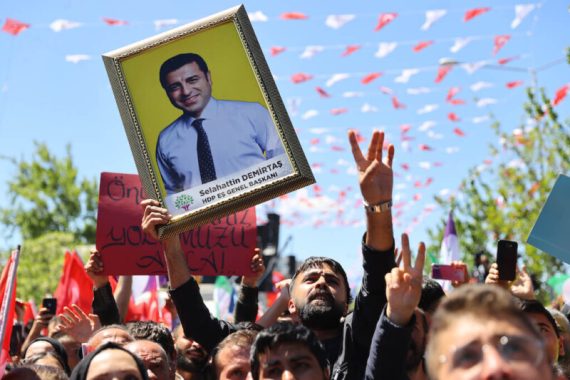A
s Turkey approaches its 2023 national elections, the political parties are campaigning both under their alliances and striving to emerge victorious on their own behalf. The great struggle for both the presidential and parliamentary elections is palpable. In what can be described as a normal process up to this point, an issue that has raised eyebrows is the engagement of Kemal Kılıçdaroğlu and the Nation Alliance with the People’s Democracy Party (HDP) and the Green Left Party (YSP), which was formed as a backup party for the HDP.
It is noteworthy that after various negotiations with Kılıçdaroğlu, the HDP/YSP, the legal extension of the PKK/KCK, decided not to field its own candidate and showed support to Kılıçdaroğlu’s candidacy. Moreover, an adjunct development is the PKK/KCK terrorist organization’s all-out commitment to the election process: a terrorist organization, which by its very nature should be kept away from any legitimate political process, has begun to conduct a political campaign.
The organization’s top leaders have been issuing statements almost every day, propagandizing that President Erdoğan must be toppled. From Cemil Bayık, Murat Karayılan, and Mustafa Karasu to Duran Kalkan, Remzi Kartal, Helin Ümit, and Sabri Ok there is almost no leader of the organization who has not issued a statement.
In fact, immediately after the earthquake, the PKK/KCK made a declaration of non-conflict until the elections. In the declaration, PKK co-chair of the Kurdistan Communities Union Besê Hozat emphasized that the May 14 elections were unlike any other elections. She stated that she supported the HDP’s decision not to field a candidate in favor of Kılıçdaroğlu and announced that the organization had stopped “military actions’’ until the end of the elections. According to Hozat, “If a strong struggle is waged together in the election process, this fascist government will be overthrown on May 14.” Later, similar statements from the so-called leadership cadres followed.
Duran Kalkan’s statements, which appeared in the press on April 18 and were especially striking, elucidated the PKK/KCK’s related course of action. Kalkan stated, “Erdoğan mobilized the National Intelligence Organization (MIT) to kill us. They have announced our names on a list, and no one says a word. We are under attack everywhere: the media, defense areas, in the tunnels in Bakur. We are being killed in Qandil, in Shengal, in Rojava. He kills every day. No one says a word. They have created lists about our leadership. Red list, yellow list, green list, grey list, that is, they put 30 or 40 names on each list. They put pictures. These are not wanted lists; it is a list of those who will be killed publicly.” His statement revealed how the PKK/KCK is under pressure, how the leading cadres have become unable to act and manage the organization, and clearly painted a picture of the PKK’s exhaustion.
The rise of the MIT in the eradication of the PKK
So why is the so-called leadership of the organization burnt out despite the U.S. patronage in Syria, the support of Iran, Hashd Al-Shaabi, and the Patriotic Union of Kurdistan (PUK) in Iraq, and all the aid provided by European countries and Israel? The answer is Turkey’s counterterrorism doctrine and the MIT’s operation against the organization. In the aftermath of the July 15 coup attempt, Turkey changed its paradigm with a new security doctrine and adopted a proactive approach in the fight against PKK terrorism, seeking to eliminate the terrorist organization through military and point operations.
One of the most important pillars of this doctrine is undoubtedly the MIT. Especially after the July 15 coup attempt, there have been significant developments in the organization’s capabilities: the MIT, whose human capital and technical capabilities have significantly increased, started to assume important roles in carrying out pivotal operations both within Turkey and across the border in Iraq and Syria, such as Operation Euphrates Shield, Operation Olive Branch, and Operation Peace Spring.
Under the leadership of Hakan Fidan, the organization, which has renewed itself in the face of changing world conditions and security threats, increased its effectiveness by expanding its legal infrastructure, technical, cyber, and human capacity. It has also accomplished great tasks in the context of identifying and neutralizing senior figures of the PKK terrorist organization. Kalkan’s statement that “we [the PKK] are being targeted in all regions, we are being killed,” in fact refers to the MIT’s effective strategy known as “decapitation”—the process of neutralizing the organization’s leadership cadre.
The MIT started to carry out very important operations against the PKK and its subcomponents in Syria and Iraq. While the organization’s leadership cadres were purged and the organization’s command-and-control structure was weakened, the move also aimed to collapse morale and motivation. These aims were met with great success. Since 2016, more than 500 names, including key PKK/KCK central executive committee members from Diyar Garip, a member of the so-called presidency and executive council of the PKK to Sinjar commanders such as Mam Zeki Şengallı have been neutralized in Iraq and Syria thanks to MIT operation units.
Some operations were carried out hundreds of kilometers away from the Turkish borders. These operations, in which UCAVs are used effectively, are managed by agents in the field. While Turkey conducts conventional military operations, the MIT, whose capabilities have been improved in every sense and which has gained a new strategic mission, eliminates elements threatening Turkey’s national security through simultaneous operations. The MIT has become a rising organization in the global context and a very important multiplier for Turkey, reaching a capacity enjoyed only by a few intelligence agencies in the world.
Recommended
The PKK’s weakening position and Kılıçdaroğlu
The PKK/KCK leadership is burnt out and has largely lost its ability to act within the above framework. It is now focused on targeting the political will led by Erdoğan rather than achieving results through terrorism, thinking that it can escape its predicament with the change of the current government. This is the motive behind the PKK’s decision to be inactive and its systematic statements during the election process. The leadership has instrumentalized its structures such as the HDP and YSP in the legal field to prevent Erdoğan from coming back to power at any cost and, in this way, it hopes to prevent the Turkish Armed Forces (TAF), the MIT, and other security bureaucracies from continuing their current successful work.
Unfortunately, the position of Kemal Kılıçdaroğlu and his staff has vicariously allowed this idea to emerge. While the PKK’s leadership cadres are being purged one by one and the organization is being rendered unable to carry out any action in Turkey and is under great pressure in Iraq and Syria, taking steps to revive the organization would be a betrayal of Turkey’s future.





